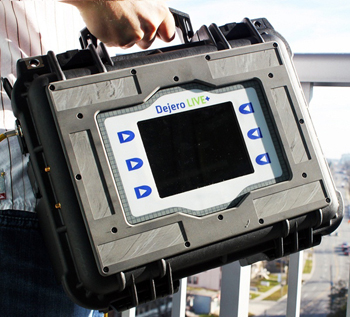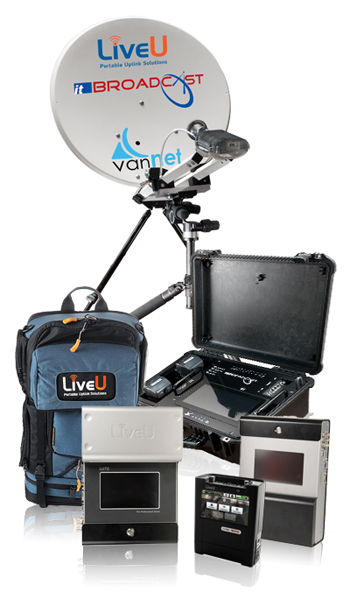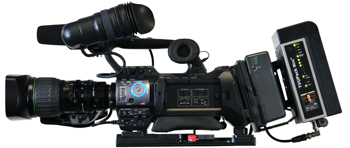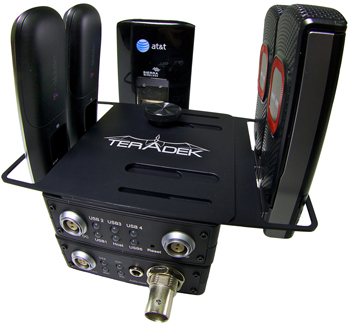Bonded Cellular Systems To Capture World Cup Action
Several companies will have on-site service and repair services and one, LiveU, will provide "guaranteed," high-bandwidth hotspots.
Rio de Janeiro, Brazil—Broadcasters looking to get closer to the action and remain flexible on their feet will utilize bonded cellular camera transmission systems virtually everywhere during the FIFA World Cup 2014 soccer tournament in Brazil. Dozens of broadcasters will carry high-definition-compatible technology from Dejero Labs, LiveU and TVU Networks in an effort to give viewers the most compelling experience.
Once an experimental technology, these systems, which use multiple data carrier services (via a series of "bonded" cellular data cards) to send video, are now a mainstay of every broadcaster's toolbox. In Brazil, the technology will help capture news reports and alternate footage—such as interviews with players, team training sessions, and enthusiastic fans entering and leaving the arenas.
All of these companies will also have on-site service and repair services and one, LiveU, will provide "guaranteed" high-bandwidth hotspots in Rio de Janeiro, Sao Paolo and Brasilia. Customers seeking additional bandwidth in heavily congested areas will use these drop-in centers.

Dejero's LIVE+ 20/20 transmitter and the LIVE+ Mobile App give videojournalists the ability to encode and transmit broadcast-quality video directly over LTE, 4G, 3G, Wi-Fi, or Ethernet connections. Beginning in early June, broadcasters will be able to rent Dejero's LIVE+ 20/20 transmitter and reporters install the Dejero LIVE+ Mobile App on their iOS and Android smartphones and tablets, enabling them to transmit live coverage and also to store and forward video for later broadcast.
Both the LIVE+ 20/20 transmitter and the LIVE+ Mobile App give videojournalists the ability to encode and transmit broadcast-quality video directly over LTE, 4G, 3G, Wi-Fi, or Ethernet connections from locations that can be impractical for traditional sports production vehicles to access. The LIVE+ 20/20 Transmitter is a portable bonded wireless system that can be easily transported from venue to venue.
In addition, Dejero will provision Brazilian SIM cards for each transmitter and mobile device, and will provide in-country technical support to ensure that each transmission is a success. The broadcasters' master control personnel will have access to the cloud-based Dejero LIVE+ Portal to manage and control transmitters, monitor transmission health, and manage the distribution of content on air and online.
Get the TV Tech Newsletter
The professional video industry's #1 source for news, trends and product and tech information. Sign up below.
The Comrex LiveShot HD cellular transmission system will also get a workout in Brazil, where Brazilian network Rede Globo will be testing it at several of the World Cup venues. LiveShot uses a built-in H.264 codec to send live, low latency, video (and audio) over wireless IP networks. It also offers connection to personal hotspots via two USB ports.

The Comrex Liveshot uses a built-in H.264 codec to send live, low latency, video (and audio) over wireless IP networks. Unlike its competitors, LiveShot uses a two-way video/audio IP codec, eliminating the need to carry extra equipment, or a backpack, for remote interviews and ENG. The combination of low latency (typically 300ms to 1sec), studio/field 2-way intercom plus two discreet IFB channels andreturn video will provide field reporters with all they need—housed in a single box the size of a camera battery. [In Brazil, Comrex will also supply more than a dozen of its Access IP Audio codecs to cover the World Cup.]
LiveU said that media companies from over 30 countries will deploy more than 200 LiveU units in the 12 host cities across Brazil. The wireless transmitters will provide live video transmission, as well as hot spot connectivity via the company's new LiveU DataBridge solution, which turns any LiveU unit into a bonded cellular hotspot for any kind of Internet usage on any device. LiveU's support team will be on the ground in the different locations, offering onsite 24/7 support in multiple languages during the tournament.

A wide variety of transmission technology from LiveU will be used at some point during the 64 World Cup matches. During the tournament, LiveU will also provide onsite support at all the main venues in Brazil—both directly and through its local partner, UCAN Digital Transmission. The company's entire portfolio of uplink solutions—including its backpack and camera-mount cellular bonding devices such as the LU500 and its signal boost Xtender external antennas—will be used.
Customers will include global sports and news networks, news agencies, local stations, and online broadcasters from almost every participating country in the tournament. All units in the field can be controlled directly by the operator, or remotely from the studio in the home country via the browser-based LiveU Central management system.
"Our goal is to be very dynamic, delivering great content with solid facts," said Allan Pessoa, Technology Manager with TERRA, an Internet production company that will use LiveU technology during the World Cup. "LiveU provides us with the mobility and technology to do that."
The content will be available on TERRA's web site (www.terra.com.br) for multiscreen viewing. TERRA and UCAN expect to reach more than 80 million people in Latin America by using LiveU solutions.
Meanwhile, TVU Networks will also once again provide its wireless transmission technology for a major sporting event. In Brazil, the company's TVUPack will support several of the world's most prominent broadcasters from North and South America, Europe, Asia, Australia, Africa and the Middle East. These include customers that have taken advantage of special comprehensive TVUPack rental packages offered to broadcasters looking to cover this major sports event.

New products, like TVU Networks' TVUPack Mini will be put to the test in Brazil. As with other major sporting events such as the London and Sochi Olympics, TVU said it would have dedicated technical support personnel on location to ensure that each TVUPack transmission is successful. TVU is providing an array of support services that include certified local cellular modem cards. Broadcasters using TVUPack will also have access to in-country best practice advice regarding optimal transmission from TVU personnel.
Used by hundreds of broadcast organizations around the world, the TVUPack family of IP transmission solutions gives customers a powerful and reliable tool to distribute live video content to broadcast, online, and mobile platforms. Broadcasters looking to take advantage of the TVUPack Global Rental program can contact TVU via phone at +1-650-265-2811, via email at globalrentals@tvunetworks.com or via the TVUPack website.

Teradek's Bond Pro unit will be used extensively at several of the World Cup venues.
Broadmedia, a local reseller in Brazil, has supplied dozens of Teradek's Bond II and Bond Pro bonded cellular units to a variety of TV stations in the area—both for sale and rental as part of a comprehensive ENG package. Customers include TV Globo, TV SBT and affiliate stations to TV Record, TV Bandeirantes, public TV channels and several religious channels, from all parts of the country.
Broadmedia's ENG packages sometimes include access to its "Sputnik in the Cloud" server (made by Embratel), Claro and Vivo 4G LTE services. The company has also provided services such as consultation, installation and training, both before and during the World Cup tournament. All Teradek Bond devices require a Sputnik server, which converts each bonded feed into a standard video format that can be sent to any streaming platform on the Web or to many H.264 decoders.
The Teradek Bond line of cellular transmission solutions allows users to send 1080p HD video over aggregated bandwidth from several network interfaces, including 3G/4G/LTE, WiFi, BGAN, and Ethernet. The company's Bond devices utilize hardware-based high profile H.264 compression, resulting, the company said, in very low power consumption and long run times. In addition, each Teradek wireless transmitter offers a local monitoring capability on iOS devices, closed captioning support, and IFB for communication from the studio to the field.
